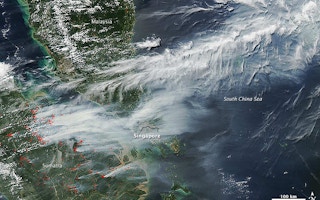ASEAN yesterday showed its resolve to tackle the haze that has choked the region in recent weeks, by directing its senior officials to both consolidate current initiatives and recommend steps to prevent a recurrence.
A joint communique issued after the 10 foreign ministers met here also said there would be a progress report on these efforts to top leaders at the next Asean summit in October.
Asean also reaffirmed its commitment to establish effective monitoring, rapid response and firefighting systems. It called on countries which have not ratified a 2002 Asean Agreement on Transboundary Haze Pollution - Indonesia is the only one - to do so “expeditiously”.
The consensus was worked out by foreign ministers from Singapore, Indonesia and Malaysia during an informal meeting last Saturday, and agreed to by the rest during yesterday’s Asean Ministerial Meeting.
Last Saturday’s meeting, which involved the three countries worst hit by the haze, took place at the suggestion of Singapore’s Foreign Minister K. Shanmugam. He said the haze paragraph in the communique focuses on “the importance of putting out the fires, of monitoring, verifying to prevent recurrences in the future”.
Details have yet to be worked out but Singapore has emphasised as recently as a week ago that the long-term solution is for Indonesian farmers to adopt a more sustainable method of clearing plantations.
While it may not be possible to totally stop poor farmers from slash-and-burn practices, Emeritus Senior Minister Goh Chok Tong said on Facebook that it “should be easy” to prevent commercial plantation owners from doing so next year.
“With satellite technology, new laws if necessary, and political will, smoking guns can be identified, confiscated and made to pay if they are fired,” he wrote, on a day when the Pollutant Standards Index in Singapore fell to its lowest level in a fortnight.
Separately, Mr Shanmugam said Singapore, Malaysia and Indonesia had also agreed on a trilateral process where officials will look at what is happening on the ground and make recommendations on the way forward. These officials could come from the foreign affairs and environment ministries, and Indonesia’s forestry ministry. The group will also give an update at the Asean summit.
Indonesia’s Foreign Minister Marty Natalegawa said it was good to have an outcome that recognises the haze as an issue that must be addressed at the national level, and in synergy with regional efforts.
Asked if Singapore’s objectives had been achieved, Mr Shanmugam said: “What you really want is for the entire region to be free of haze, and that will involve actions over a period of time.”
The challenge would be in implementation but “I would say our views as to how Asean needs to deal with it have come true”.
Meanwhile, a spokesman for Indonesia’s National Disaster Mitigation Agency said the number of hot spots has fallen from a peak of 265 last Monday to one last Saturday.
ESM Goh also thanked Indonesia’s President Susilo Bambang Yudhoyono for showing will, graciousness and dignified statesmanship in dealing with the haze.
“This is appreciated, in contrast with the boorish remarks of some of his ministers,” he added.










